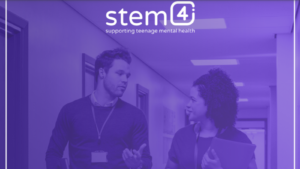A survey of 500 teachers by stem4 has revealed the extent of the children’s and young people’s mental health crisis in Britain.
The new stem4 figures show that half of all teachers (56%), including 46% of teachers in primary school, say they have feared that at least one of their students will come to harm while waiting for treatment over the last year, compared to one third (32%) in 2018. Meanwhile, teachers say that five students in a virtual class of 22 (1 in 4) are now experiencing mental health difficulties as a consequence of the pandemic, an increase of 20% in just ten months.
Further, over the past five months, one in five teachers say they have witnessed at least one of their students showing suicidal (16%) and self-harm (21%) behaviours. Nearly nine in ten (88%) teachers say they have seen pupils suffer with anxiety, and almost half (46%) have witnessed a student with depression. Other common problems include emotional and behaviour disorders (ADHD), aggression and concentration issues (41%), eating disorders (22%), addiction (12%), obsessive compulsive disorders (OCD) (11%), and post-traumatic stress disorder (PTSD) (8%).
Most teachers predict that the longstanding mental health crisis will bring schools and colleges to breaking point as young people suffer from the effects off the pandemic. 68% of teachers point to isolation and loneliness, 41% to family difficulties, 47% to academic worries and 33% to food poverty.
Alongside stem4’s teacher survey, a Pro Bono Economics report (in association with stem4) has revealed that untreated mental health conditions of children stuck on NHS mental health waiting lists are costing schools and specialist education services £69 million a year. £48 million of that cost is borne directly by schools and colleges and £21 million by specialist education services (90%).
One Secondary School teacher said, “Teachers have needed to become front line social workers and mental health specialists as well as educators and this is not sustainable or healthy for the young people or staff.”
In response to these findings, Dr Nihara Krause, Consultant Clinical Psychologist and founder of stem4, says “In July 2020 NHS Digital found that 1 in 6 5-16-year-olds had a probable mental disorder, an increase by a third in three years – from 1 in 9 in 2017. This survey suggests that this official figure underrepresents the reality of what is happening nationally. If this government is serious about turning the tide of mental ill health in this young generation, it needs to take urgent action now. What children and young people need is access to evidence-based services at all levels, from early prevention through to expert NHS help.”

Access the full Survey Report Here

